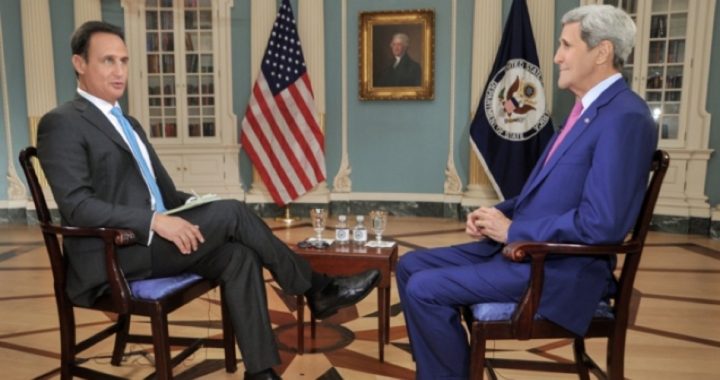
Speaking on MSNBC’s MTP Daily on September 29, Jose Diaz-Balart (shown on left), the news anchor of MSNBC’s The Rundown (as well as the Spanish language Telemundo network’s news program, Noticiero Telemundo), said that since the Obama administration opened up diplomatic relations with Cuba political repression in the island communist nation has only increased.
Cuba and the United States restored diplomatic relations — which had been severed since 1961 — on July 20.
Breitbart quoted Diaz-Balart’s statement made in response to Raul Castro’s first speech to the UN General Assembly on September 28, in which the Cuban leader called for the United States to end its embargo on Cuba. Diaz-Balart said:
You know, the embargo, if you look at how it was codified into law, it’s pretty basic and simple on how the embargo would be lifted…. It’s pretty simple how that would go away. If there is a call for free and fair elections, if political prisoners are released, if unions are allowed to organize and people can move freely within the country. If those three things happen in Cuba, then the embargo would cease to exist…. You call for democratic elections, you have a release of political prisoners, and have unions and the embargo’s over.
When MTP Daily host Chuck Todd asked, “Ever since the United States cut this deal and opened up diplomatic relations with Cuba, tell me what’s happened to political prisoners in Cuba,” Diaz-Balart replied:
Well, the increase of repression has been clear. A young man, El Sexto, who is an artist, currently in a prison in Cuba, no charges against him. He’s on a hunger strike, very close to death, and that is because, in an art exhibit, he brought out an art exhibit that had two apparently paper mache pigs. One said Fidel and one said Raul. And for that art exhibit, he’s close to death. Over the weekend, 70 people were arrested in Cuba. That includes Ladies of White [Damas de Blanco] and dissidents. The three dissidents that tried to approach the pope are still unaccounted for in prison. A lot of questions by Raul Castro, but what is going to cause a change in that government that’s been in power since January 1st of 1959?
The resumption of diplomatic relations with Cuba in July followed an April 14 White House statement that the Obama administration intended to rescind Cuba’s “State Sponsor of Terrorism” designation, which had been in place since 1982. Several members of Congress who are the sons of Cuban immigrants — including Senator Marco Rubio (R-Fla.), Senator Ted Cruz (R-Texas), Senator Bob Menendez (D-N.J.), and Representative Mario Diaz-Balart (R-Fla.) — voiced criticism of the Obama administration decision. Mario Diaz-Balart is Jose Diaz-Balart’s brother. Another brother, Lincoln Diaz-Balart, is a former U.S. representative from Florida.
Back in 2009, when the Obama administration announced that it would ease U.S. restrictions on dealings with Cuba, including allowing unlimited travel and money transfers by Cuban Americans to families in Cuba, the two Diaz-Balart brothers serving in Congress issued a joint statement on April 13, 2009, disagreeing with the president’s decision. The statement noted, in part:
President Obama has committed a serious mistake by unilaterally increasing Cuban-American travel and remittance dollars for the Cuban dictatorship….
Despite the Cuban dictatorship increasing its repression of pro-democracy activists, torturing countless prisoners of conscience, and refusing to allow human rights activists and observers into the country, President Obama has violated his pledge of January 20 by unilaterally granting a concession to the dictatorship which will provide it with hundreds of millions of dollars annually….
We call upon President Obama to not grant any further unilateral concessions to the Cuban dictatorship.
The reason for the imposition of the U.S. embargo Cuba 1960 and the suspension of diplomatic relations between the United States and Cuba in 1961 was that the U.S. government finally recognized that the Cuban regime headed by Fidel Castro was both communist and brutally repressive. Both the suspension of diplomatic relations, and the subsequent badly botched CIA-backed Bay of Pigs invasion that same year, came during the administration of John F. Kennedy.
Prior to that diplomatic break, however, President Dwight D. Eisenhower had officially recognized the new Cuban government, just six days after the communist-led revolution that had overthrown the Batista government on January 1, 1959. In an April 26, 1963 press conference, Eisenhower, belatedly recognized Castro’s communist nature, but claimed: “It would have taken a genius of prophecy to know that Castro was a Communist when he took control of Cuba.”
Yet, a month before Castro came to power, on December 8, 1958, at the founding meeting of The John Birch Society, Robert Welch warned: “If you have any slightest doubt that Castro is a Communist, don’t. If he is successful, time will clearly reveal that he is an agent of the Kremlin.”
However, as The New American’s editor, Gary Benoit, noted in a 2008 article: “Of course, Robert Welch’s warning that Castro was a Communist was not based on prophecy or clairvoyance, but on evidence.”
Some of that evidence was summarized in our online article “The Betrayal of Cuba,” by Michael E. Telzrow.
The history of communism in Cuba is filled with U.S. complicity that goes even beyond the sellout of the brave freedom fighters at the Bay of Pigs in 1961. U.S. foreign policy as far back as the 1950s was engineered to cause the downfall of Fulgencio Batista — who despite his faults, allowed a greater degree of personal freedom for Cubans than has existed ever since — and helped bring Fidel Castro to power. Our government placed an embargo on the arms Batista needed to defend Cuba from the Castro guerrillas, while Castro was able to get all of the arms and ammunition he needed from the Soviets and their Latin American surrogates. After Castro’s successful revolution, as we noted above, the Eisenhower administration was so anxious to help the dictator solidify his position that full diplomatic recognition was extended to the Cuban regime just six days after Batista had fled the country.
Jose Diaz-Balart and his brothers are well aware of the nature of the Castro regime, now run by Fidel Castro’s younger brother, Raul. Jose’s aunt, Mirta Diaz-Balart, was Fidel Castro’s first wife.
If Diaz-Balart’s assessment that conditions in Cuba have only worsened since the Obama administration has extended an olive branch, then it is obvious that the Castro regime, like all other communist regimes, will only continue to take advantage of any signs of weakness on our part. Diaz-Balart’s two brothers in Congress admonished Obama in their 2009 letter to “insist upon the three fundamental goals for Cuba enshrined in U.S. law which have long constituted a bipartisan U.S. Policy of State”:
First, The liberation of all political prisoners;
Second, the legalization of all political parties, independent labor unions and the press, and;
Third, the scheduling of free, internationally supervised elections.
Only by offering these basic freedoms will the Castro regime demonstrate the good will necessary to secure further considerations from the United States.
Related articles:
Obama To Rescind Cuba’s “State Sponsor of Terrorism” Designation
Globalists, UN, and Big Business Legitimizing Cuban Regime
Obama to Lift Some Cuban Restrictions
Obama Set to Remove Castro Terror Regime from U.S. Terror List
Obama’s One-way Street to Cuban “Normalization”
Obama’s Political Career Began With Castro-backed Terrorist
Globalists, UN, and Big Business Legitimizing Cuban Regime
Obama Praises Mandela, Shakes Castro’s Hand, at Memorial



